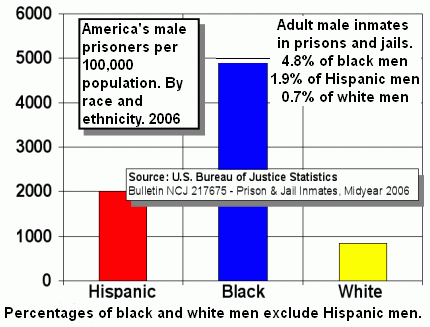While reviewing the page on Hispanic crime and illegal immigration in the United States, I noticed the following paragraph I’d written a while back while preparing the page:
Inclusion of blacks in native groups compared against?: Restrictionists generally compare the crime rate among Hispanics with that among “non-Hispanic whites” (rather than all Americans, which would include blacks). Supporters of Hispanic immigration claim that a better comparison would be against all Americans (including blacks). These two different types of analysis yield quite different conclusions because the crime rate among blacks in the United States is higher than that among all other racial categories (whites, Hispanics, and the numerically much smaller East Asians, South Asians, and other racial minorities).
At the time I wrote this, I didn’t clearly try to understand why so many restrictionists choose to use “non-Hispanic whites” as the normative comparison standard against which to judge Hispanic crime rates (and, by extension, the crime rates of prospective immigrants). [NOTE: If you read the page, you’ll discover that immigrants have lower crime rates than natives, both in total and when compared for specific ethnicities or specific combinations of ethnicity and high school graduation status. Restrictionists, however, prefer to consider the crime rates of Hispanics rather than immigrants, but this is a topic for another day.]
Here are a few random quotes from restrictionists illustrating this.
Tino Sanandaji comments on a blog post here:
Chinese textiles do not commit crime at 261% of the native white rate. [a reference ot Hispanics committing crimes at 261% the native white rate]
Another comment in a blog post on immigration here:
Hows this for a fear inspiring anecdote: The hispanic incarceration rate is 2.9 times the non-hispanic white rate…. oops, that’s a statistic. And yes, it should inspire fear if you have an ounce of rationality in you.
I haven’t been able to locate an explicit explanation from a restrictionist for why this choice was made, so I’ll just include my guesses here. I see two possible explanations for this choice by restrictionists.
Non-Hispanic white normativity as a principled position
One explanation is that the use of non-Hispanic whites as the normative comparison standard is a principled position. Non-Hispanic whites are treated as the “norm” or “normal”. Any individual or group that does as well as the non-Hispanic white norm is considered average. Any individual or group that does better than the non-Hispanic white norm is considered above average. For instance, in the context of height, groups whose average height is greater than that of non-Hispanic whites would be considered “tall” and groups whose average height is lower than that of non-Hispanic whites would be considered “short.”
Critical race theorists use the term “normativity” in conjunction with ideas of privilege and prejudice, but my use here does not connote either privilege or prejudice, though it might on on occasion be linked to these. It could be a form of “centric bias” whereby people believe that their own selves or immediate surroundings are the norm, standard, or prototype. It does not, however, mean that they automatically disparage different things. A person growing up poor may consider low incomes the “norm” but that does not mean disparagement of high incomes — quite the contrary, the person may be more easily impressed by mid-level incomes than somebody who grew up rich. In the same way, non-Hispanic white normativity does not indicate a disparagement of other groups.
Non-Hispanic white normativity as a trade-off
Here’s a more cynical explanation of non-Hispanic white normativity. Restrictionists, when choosing a comparison group to judge immigrants or immigrant ethnic groups against, have to balance two criteria:
- The immigrants or immigrant groups should perform clearly worse on the indicator than the comparison groups.
- The comparison group should be something that a large number of their readers can identify with.
In an ideal world, immigrant groups would show performance that’s clearly worse than natives on the whole, and hence immigrant groups could be compared directly against natives, or “all Americans” — this would appeal to a maximum number of Americans.
However, there are many cases, such as crime, where immigrants, and immigrant ethnic groups, don’t perform worse than natives on the whole in a clear way. Restrictionists thus need to narrow down the definition of native. At one extreme, the restrictionist could narrow down to “upper middle class college educated whites” or “Ph.D. Ashkenazi Jews” as a comparison group and immigrants/immigrant ethnic groups would perform quite badly in comparison. While this is great for (1), it compromises on (2) — the comparison group is too small and few readers would identify with it. The middle ground of choosing “non-Hispanic whites” or “native non-Hispanic whites” yields a sweet spot that makes immigrant groups look reasonably bad by comparison, and also allows a large number of readers to identify with the comparison group.
The chart featured at the top of this post is a breakdown of the US incarceration rate by race, as of 2006. Authored by the November Coalition and released into the public domain; found on Wikimedia Commons.

